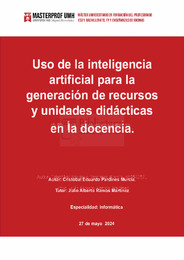Resumen :
En el panorama actual la integración de la inteligencia artificial (IA) en la educación muestra
un gran potencial para personalizar el aprendizaje y aumentar la eficiencia en las tareas
docentes. Los modelos de IA generativos, como GPT-3.5, GPT-4 o GPT-4o, han llegado a un
grado de avance que pueden llegar a cambiar la manera de ejercer la docencia. Entre las
posibilidades a destacar y por las que son una propuesta más que interesante para su
integración es la generación de unidades didácticas. Estas unidades pueden a su vez adaptarse
a las necesidades específicas de cada estudiante permitiendo adaptaciones curriculares no
significativas para alumnos con necesidades específicas de apoyo educativo (ANEAE), y
promover un entorno más inclusivo. Además, mediante el uso de estos modelos de IA se
puede automatizar la evaluación de trabajos académicos, aliviando la carga administrativa de
los docentes y permitiéndoles centrarse en el desarrollo de habilidades críticas de los
estudiantes. Sin embargo, el sesgo en los sistemas de IA es una preocupación importante.
Para mitigar este problema, es esencial implementar medidas de auditoría y control que
aseguren la equidad y justicia en estos sistemas. También se debe revisar el contenido
generado, especialmente debido a la posibilidad de que la IA genere información incorrecta o
"alucinaciones". En general, la IA tiene el potencial de transformar la educación, siempre que
su implementación se maneje con cuidado y atención para evitar trabajar con información
errónea o no verificada, perpetuar desigualdades y garantizar un impacto positivo para todos
los estudiantes.
In the current landscape, the integration of artificial intelligence (AI) in education shows great
potential for personalizing learning and increasing efficiency in teaching tasks. Generative AI
models, such as GPT-3.5, GPT-4, GPT-4o, have reached a level of advancement that can
potentially change the way teaching is conducted. Among the notable possibilities and
reasons why they are a highly interesting proposition for integration is the generation of
didactic units. These units can be adapted to the specific needs of each student, allowing for
non-significant curricular adaptations for students with specific educational support needs
(SSESN), and promoting a more inclusive environment. Additionally, the use of these AI
models can automate the evaluation of academic work, alleviating the administrative burden
on teachers and allowing them to focus on developing critical skills in students. However,
bias in AI systems is a significant concern. To mitigate this issue, it is essential to implement
auditing and control measures that ensure fairness and justice in these systems. The
generated content must also be reviewed, especially due to the possibility of AI generating
incorrect information or "hallucinations." Overall, AI has the potential to transform
education, provided its implementation is handled carefully and attentively to avoid working
with erroneous or unverified information, perpetuating inequalities, and ensuring a positive
impact for all students.
|
 La licencia se describe como: Atribución-NonComercial-NoDerivada 4.0 Internacional.
La licencia se describe como: Atribución-NonComercial-NoDerivada 4.0 Internacional.
.png)
